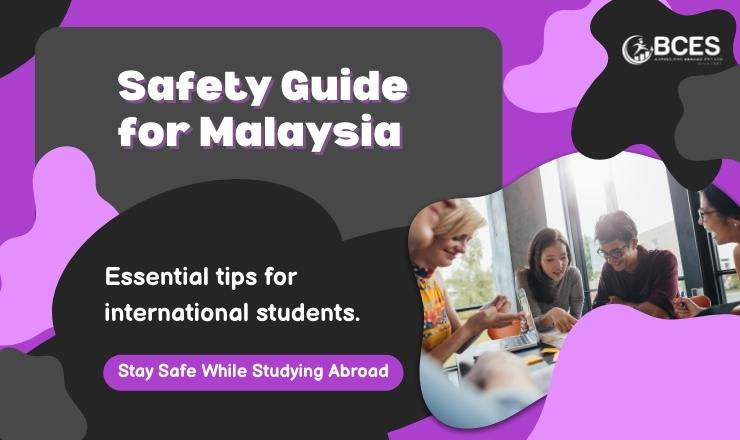Safety Guide for International Students in Malaysia

02 September 2025
Studying in Malaysia is not merely acquiring a degree, it’s an opportunity to learn in a country that lives with the marriage of modern education and good traditions and cultural diversity. For some international students, Malaysia is like a second home due to its value for money lifestyle, friendly people, and world-class universities. But living overseas also means being responsible, and one of the foremost duties is being safe while getting accustomed to a new lifestyle.
Malaysia is also reputed to be one of the safest countries in Asia, with an open and friendly environment and a huge population of international students. However, being aware and prepared makes student life go down smoothly and peacefully. At BCES Admissions Abroad, we don’t merely aim for admissions to the correct university—we also assist you in the day-to-day things of living away from home, such as staying safe and at ease.
When you first get there, it is a good idea to orient yourself with your university campus and the surrounding neighborhood. Student-friendly cities like Kuala Lumpur, Penang, and Johor Bahru have good public transport, but it is always wise to keep an eye out for your belongings. Busy areas like markets or train stations can be where pickpockets tend to target, so keeping your belongings on you and traveling lightly is an easy but good habit.
Arranging safe accommodation is just as crucial. Most students opt for university hostels, but others opt for private lettings. Whatever you choose, find accommodation in secure locations, inspect for amenities such as good lighting, gated entrance, or CCTV, and only negotiate with confirmed landlords. Another practical step is to register with your home country’s embassy or high commission once you are settled, so you have additional assistance in case of unforeseen circumstances.
Good healthcare services are included in safety as well. Malaysia boasts good healthcare services, and the majority of international students must have health insurance subsidized by their universities. Identifying where the nearest clinic or hospital is can be a lifesaver in times of crisis. Due to the hot and humid weather, drinking plenty of water, dressing lightly, and guarding against the sun are also essential components of daily hygiene.
Being respectful of cultural values is another means of remaining secure and integrating into native life. The collective strength of Malaysia is the fusion of Malay, Chinese, and Indian cultures, and students who respect traditions tend to integrate in more smoothly. Being modestly dressed in some public places, picking up a few words in the native language, and being courteous in social interactions come a long way in forging good experiences.
Online safety is equally important as physical safety in today’s world. Students are on the internet for everything these days—from classes online to banking and keeping up with family. Keeping one’s personal information confidential, not clicking on suspicious links, and connecting with university Wi-Fi or other safe networks are all good practices.
Above all, don’t let safety issues ruin your experience. Thousands of students learn in Malaysia every year and have an enjoyable, trouble-free experience. Remaining vigilant, making sound decisions, and utilizing university support systems will enable you to construct a memorable and safe experience.
We at BCES Admissions Abroad are dedicated to making your study abroad aspiration secure and successful—from selecting your course to settling into Malaysia confidently. You can contact us at +91 9319996330 for admissions advice and full student care.
Frequently Asked Questions (FAQs)
Yes, Malaysia is a secure destination to study. Universities provide student assistance, and the general crime rate is lower than in much of the rest of the international student world.
You should report the loss to the police right away and then go to your home country’s embassy or high commission and apply for a replacement.
Yes, but only during semestral breaks. Students are allowed to work a maximum of 20 hours a week in approved industries, but not during class hours.
Yes, health insurance is mandatory for foreign students. The majority of universities help arrange appropriate coverage that complements Malaysia.
Use reliable internet services and protected apps for calls and video conferencing. Some students also use cheap local SIM cards on a daily basis.